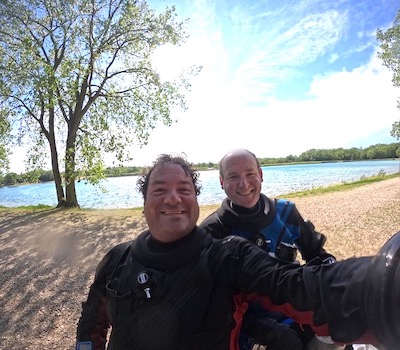How to Choose an Open Water Instructor

Choosing the right Open Water instructor is one of the most important decisions you'll make as a new diver. A great instructor sets the foundation for safe and enjoyable diving, while a poor one can lead to bad habits, discomfort, or even fear of the water. If you live in Chicagoland and if at all possible, I highly recommend you go with one of our recommended private instructors. The cost for a high quality Open Water class from a private instructor is going to be more expensive than a local shop, but you'll get so much more out of your class.
Private instruction isn't necessarily better because the instructors are more skilled. Many shop instructors are excellent. The difference comes down to logistics. Dive shops must keep class sizes larger to make courses financially viable, which means less individual attention for students. The goal is to get you certified quickly (time = cost) while staying within training standards. This is a function of the scuba training market, not necessarily the quality of the instructors. Private instruction, on the other hand, allows for more flexibility and a more tailored learning experience, helping you become a better diver sooner.
Teaching Style & Personality
Every instructor has a different teaching style, but as a new diver, it can be difficult to assess in advance. Here’s how you can get a better idea of an instructor’s approach:
- Ask former students about their experiences.
- Observe a class or a pool session if possible.
- Have a conversation with the instructor about their teaching philosophy.
- Pay attention to how they answer your questions—do they seem thorough and engaged?
Instructor’s Communication Before the Class
A good instructor should be responsive and clear in their communication before you even sign up. If they take forever to reply to emails, give vague answers, or seem disorganized, that’s a red flag.
- How quickly do they respond to questions?
- Do they give clear and direct answers, or do they avoid specifics?
- Do they provide detailed instructions on what to expect in the class?
Experience & Qualifications
Check the instructor’s experience level and certifications:
- How long have they been teaching?
- Are they affiliated with a recognized training agency?
- Do they hold additional certifications in specialties like technical diving or human factors in diving?
- Have they trained divers in environments similar to where you plan to dive?
Class Size & Student Attention
A lower student-to-instructor ratio ensures you get more personalized attention. Ask:
- What’s the maximum class size?
- Will there be assistant instructors or divemasters helping? (This is usually a good thing unless it’s a private class.)
- How much one-on-one time can you expect during skills practice?
Instructor’s Diving Experience Outside of Teaching
An instructor who actively dives outside of training courses tends to bring more real-world experience and passion to their teaching. Some instructors only dive when they are teaching students. If they regularly dive for fun or exploration, they may have a better perspective on long-term skill development and real-world dive conditions.
How They Emphasize Buoyancy Control & Trim
Buoyancy and Trim control is one of the most critical skills in diving, yet many Open Water courses only cover the bare minimum. A good instructor should emphasize buoyancy and trim throughout the course, not just during one or two dedicated sessions.
What Happens If You Struggle?
Not every student progresses at the same pace, and a good instructor should have a plan for students who need extra help. Some instructors allow additional pool sessions, while others may require you to pay for extra training.
Local vs. Destination Training Considerations
Some students take their pool and academic training at home but complete their open water dives at a vacation destination. While this can be convenient, it also means working with two different instructors.
Safety & Standards
Your instructor should prioritize safety and adhere to proper training standards. They should follow industry best practices for dive planning, buoyancy control, and equipment use, incorporate pre-dive checklists, and emphasize dive buddy communication and situational awareness.
Equipment & Training Environment
Consider the location and gear provided. Is the rental gear well-maintained? Are the training sites suitable for new divers with good visibility and minimal hazards?
Reviews & Reputation
The best way to find a good instructor is through personal recommendations. Ask friends, neighbors, or trusted divers for recommendations. Talk to local dive shops (even if you're not taking their class) and ask who they respect.
Costs & Hidden Fees
The cheapest course isn’t always the best value. Ask if the course fee includes all training materials, gear rental, certification fees, and dive site costs. Are there extra charges for additional training sessions if needed? Do they offer flexible scheduling or private lessons?
Post-Certification Support
A good instructor doesn’t just certify you, they set you up for success as a diver. Do they encourage continuing education? Will they connect you with local dive clubs or buddy networks? Are they open to answering questions after your certification is complete?